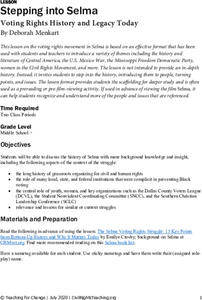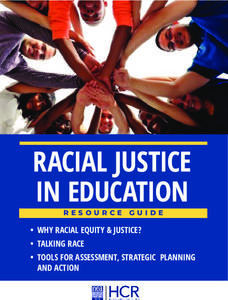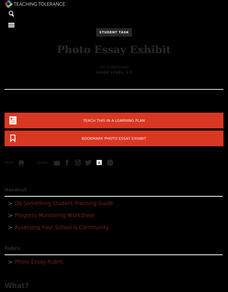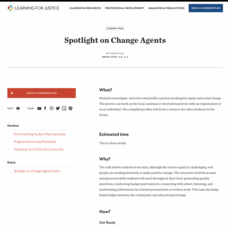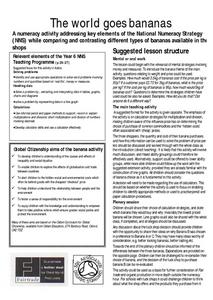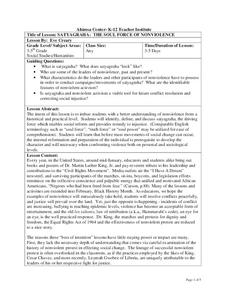Teaching Tolerance
The War on Drugs—Mechanisms and Effects
The war on drugs doesn't have definite results. An interesting lesson plan examines the social, political, and economic effect of the war on drugs. Academics learn how the war on drugs has led to mass incarcerations and negatively...
Teaching Tolerance
Mass Incarceration as a Form of Racialized Social Control
Mass incarceration: A result of a tough stance on crime or racial discrimination, you decide. Academics explore the history and reasons behind mass incarcerations in the United States and its impact on ethnic communities. The...
Teaching Tolerance
Introducing 'The New Jim Crow'
When Jim Crow Laws ended, the intent behind them did not. Academics read "The New Jim Crow Laws" and an interview from the author to understand how racism has not ended, but rather changed over time. The lesson explains how prejudices in...
Teaching for Change
Stepping into Selma
The 1964 Selma to Montgomery, Alabama voting rights marches are the focus of a lesson designed to introduce learners to people who took part in the Civil Rights Movement. Class members set into the role of one of the participants,...
Teaching Tolerance
Persuasive Letters
Sharpen persuasive writing skills while trying to solve a community problem. Learners choose a burning topic and then write letters to persuade others to come around to their views. The provided procedures walk through how to guide the...
Teaching Tolerance
Tweeting for Change
Do some good with social media. Secondary scholars participate in a live Twitter chat focusing on social justice issues. The thought-provoking activity allows academics to set up a live chat, create responses, and express their personal...
National Education Association
Racial Justice in Education Resource Guide
Strive for racial justice within your classroom community with help from an 80-page resource guide. Five modules move scholars through thoughtful, and reflective grand conversations to making a plan, then taking action. Learners write...
Facing History and Ourselves
Speaking Up and Speaking Out
The final lesson plan in the Standing Up for Democracy unit offers class members a way they can stand up and speak out by crafting spoken word poetry, or Slam poetry. After analyzing several examples, individuals reflect on one positive...
Facing History and Ourselves
Protesting Discrimination in Bristol
Using the Bristol Bus Boycott as a case study, class members examine the strategies and levels of power protesters used to effect change. The two-day instructional activity concludes with individuals reflecting on the actions they might...
Teaching Tolerance
Photo Essay Exhibit
Let the pictures do the talking. Children tell their stories using provided guidelines for a photo essay exhibit. Discussion questions and checklist materials help pupils brainstorm and create photo essays to help inspire social change.
Teaching Tolerance
Spotlight on Change Agents
A thought-provoking resource guides learners as they interview agents of social change and share their findings. Scholars select an individual, create questions, conduct the interview, and create a profile of the person they selected....
Helena-West Helena School District
I Know Why the Caged Bird Sings Instructional Unit Plan
Maya Angelou's first autobiography, I Know Why the Caged Bird Sings, demonstrates both the author's exemplary writing and the themes of gender and racial injustice that perpetuate beyond the limits of the 20th century. Use a thorough...
Museum of Tolerance
The Pursuit of Democracy and Diversity: The Trial of Pro-Social Injustice in Historical Documents and Accounts
Class members investigate The Indian Removal Act of 1830, U.S. Theft of Mexican Territory Timeline, and President Abraham Lincoln’s letter to Horace Greeley, 1862, and then conduct a mock trial of each of these documents to determine...
Curated OER
The True Confessions of Charlotte Doyle: KWHL
After completing the 11th chapter of The True Confessions of Charlotte Doyle by Avi, take part in a KWHL chart driven by the question,When is it appropriate and admirable to defy authority? Focusing on codes of conduct, scholars...
Curated OER
The World Goes Bananas
Learners comprehend the causes and effects of inequality and social injustice. They explore the effects of globalization and trade between countries. Students discuss the hidden social and environmental costs which often lie behind goods...
Curated OER
What Is Your Gripe?
High schoolers discuss historical examples of social injustice and identify perceived social injustices today. They share incidents in their lives when they confronted such experiences.
Curated OER
Satyagraha: The Soul Force of Nonvilence
Pupils discuss what satyagraha is understanding that it is the driving force which enables social reform. In this social science lesson, students try to internalize the principles of nonviolence on an individual level and then a global...
Other
Middle Tennessee State University: The Progressive Movement: Life as a Muckraker
In this lesson plan, young scholars learn about the muckraking journalists who exposed social injustices during the Progressive Era and what the Progressives believed. They will examine primary sources, including the works of prominent...





